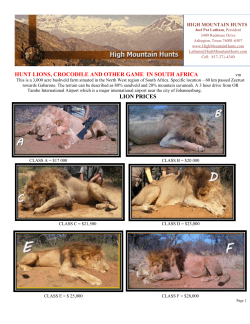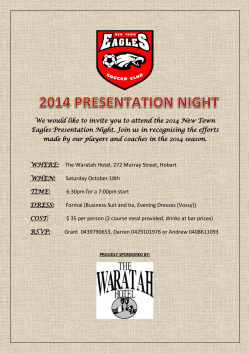
Hobart Airport 2015 Surrounding Environment
Our environment. A balance between development and the environment. The extension of Hobart Airport’s runway is a major development for the future of Tasmania’s main gateway, and will ensure it continues to play an essential role in the growth of the Tasmanian economy. Runway extension and the Environment. Barilla Bay The extension of Hobart Airport’s runway means that the navigational and landing systems need to be changed. For 60 years, Hobart Airport has been operating on a coastal spit adjacent to Seven Mile Beach. With its surrounding hills, mountains and water, flying into Hobart Airport provides one of the most beautiful approaches in Australia. Hobart Airport management is committed to ensuring a balance between conservation and development. Environmental Management is a core part of the Airport’s daily operations. The Airport has a rigorous Environmental monitoring and reporting program. To the north of the runway, approach lights will need to be placed further out into Barilla Bay, a Ramsar-listed wetland that also contains operating oyster farms. This will involve installing additional piers into Barilla Bay to support the lights, which will extend an additional 70 metres beyond the existing lights. Hobart Airport is committed to protecting the values of this sensitive area while undertaking this work. Following talks with environmental groups, oyster lease holders and other environmental studies, Hobart Airport is working to ensure that the light installation will have little impact on the environment. Hobart Airport has produced an Environmental Protection and Biodiversity Conservation referral for the Australian Government, which will be assessed as part of the approval process for the runway extension. We welcome your comments Hobart International Airport Pty Ltd (HIAPL) takes its environmental responsibilities seriously. It is committed to maintaining the airport’s environmental values. Our environmental management plan can be found on our website. If your community group would like to meet with us to discuss the runway project, please contact us on 03 6216 1600. More information about the Airport Master Plan and Major Development Plan can be found at hobartairport.com.au Runway extension and the environment. Seven Mile Beach To the southern end of the airport, some changes are needed so that aircraft can operate safely. Key changes 1 A portion of Surf Road must be closed to vehicles. Additional information is provided in our roads fact sheet. 2 To provide the required glide path for aircraft, a sand dune that borders Surf Road must be lowered. This particular dune already houses aircraft navigational aids and has been significantly altered in the past to ensure safe aircraft operations. A thorough environmental assessment of the dune system has been undertaken. The lowering of this dune will not impact on its stability and no threatened species will be affected by this change. A visual impact assessment has also been undertaken, which shows a low impact on the appearance of the dunes. There will also be little visual impact seen from Seven Mile Beach. Images from this assessment can be found on the Airport’s website. Aircraft noise Due to its location, with bodies of water at both ends of the runway, and good planning, noise from Hobart Airport has a minimal impact on the local community. Approvals Hobart Airport currently has no curfew in place, meaning it can operate 24 hours a day. This is a strong advantage in attracting flights and is essential for Antarctic operations. In planning for the runway’s extension, Hobart Airport has undertaken extensive noise modelling, to assess the impact of the runway extension. These have shown that the extended runway will have minimal changes in the current noise created by airport operations. Hobart Airport is regulated under the Airports Act of 1996. It is currently completing two important documents, which will be released for public consultation: Master Plan – an overaching plan for the next 5 and 20 years; Major Development Plan – a plan specifically for the runway project.
© Copyright 2025










